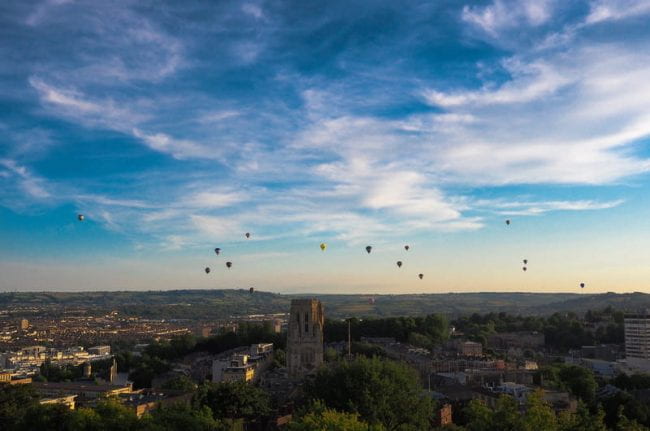Contributors:
Dr Helen Manchester, Reader in Digital Inequalities and Urban Futures in the School of Education, University of Bristol
Dr Ola Michalec, Research Associate in the Faculty of Engineering, University of Bristol
Professor Morag McDermont, Professor of Socio-Legal Studies at the Law School, University of Bristol
In this blog, three academics from the University of Bristol share their experiences of civic engagement in 2020, outlining their perspectives on what went well, barriers they faced and their hopes for the future.

The need for universities to interact and work alongside their local communities has been underlined more so than ever in 2020.
PolicyBristol asked three academics who have been engaging with the wider community in Bristol to outline their experiences and hopes for the future.
Dr Ola Michalec currently sits on the Bristol Advisory Committee on Climate Change (BACCC). This independent committee is made up of technical experts from industry, policymakers, and academics with expertise on climate change. Ola worked at the council before starting her research, so when BACCC was set up in 2019 she brought both policy and research experience.
Bristol City Fellowships is an innovative programme of fellowship opportunities for academics and practitioners working alongside communities at the margins, which aims to build inclusive cultures of collaboration in the city. It is a joint programme between the University of Bristol, Bristol City Office, and the Social Justice Project. Two of the fellows are Bristol academics – Dr Helen Manchester and Professor Morag McDermont.
Helen, Morag and Ola shared their perspectives with PolicyBristol who have coordinated their responses below.
Highlight some positives and impacts of your experiences:
Ola: Bristol has such an active sustainability scene which means there is a wealth of expertise on sustainability in the city. The collaborative nature of BACCC, with experts providing technical evidence without an agenda is an important way to add to the debate in an independent cross-sector approach.
The impact is long term so immediate impact is difficult to measure however BACCC have already been involved in commenting and making changes to the Climate Strategy.
Helen and Morag: Despite its disruption, the pandemic has created engagement opportunities for the Fellows and the communities they work within in new and often more intense ways. As the organisations the Fellows work within have had to respond, so they have been able to reshape their roles, enabling them to work with the assets of the communities that have become so prevalent in the last 9 months.
The Bristol City Fellows have also been able to work closely to support the One City Plan and have also been invited to participate in an advisory board for a Citizens Assembly.
Were there any barriers?
Ola: While the broad remit of sustainability has created so much opportunity and expertise in Bristol, I found the challenge was in clearly defining the committee’s terms of reference to allow the group to find their identity and priorities. The organisation is voluntary so there is no guarantee that experts can find the time between their day jobs to contribute their expertise or opinion.
COVID-19 also made BACCC even more reliant on technology, coordinating the virtual transition had its challenges!
Helen and Morag: While COVID-19 did allow for some greater connections to be made, it also created challenges. The fellows started in February 2020 so quickly had to redirect their work priorities to crisis management as community organisations had to prioritise supporting local citizens during the pandemic.
Additionally, COVID-19 restrictions meant that intended engagement with communities at the margins was not possible in the way previously envisaged through face to face and community events.
What would be on your Christmas list for academics or policymakers in 2021?
Helen and Morag: We both hope for communities at the margins to have access to the resources they need so they can become central to Bristol’s Build Back Better programme to tackle enduring inequalities, which have become even more visible during COVID-19.
This also requires policymakers and academics to have access to resources – both time and funding – that enables them to meaningfully engage with Bristol’s diverse communities.
Ola: I hope for COVID to be controlled, damage limited, and lessons learnt quickly so that sustainability can return to being central to the public agenda.
With the One City Climate Plan amongst other things, climate and sustainability was slowly establishing a central role however COVID-19 is currently the lens we see everything through.
Final thoughts:
Helen and Morag: We need to find ways of convening long term conversations between policy makers, academics and communities at the margins that go beyond the ‘short termism’ of many political processes in our cities and communities.
Ola: There is a need for capabilities to build these types of connections, especially local or city-based connections to policymakers. There is a high value currently placed on international aspect of research but not everything can be internationalised. The local is still important and meaningful.
For universities that aspire to be integrated into the fabric of the city they are placed in, there needs to be more attention paid to not neglecting the local – even if it doesn’t sound as glamorous!
This blog post was originally published Universities Policy Engagement Network (UPEN) blog. Read the original article.
